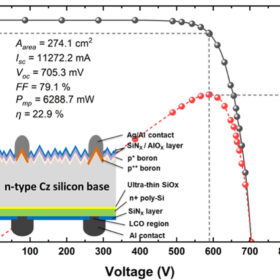French company unveils PVC-based mounting system for C&I solar projects
Renolit Ondex says its PVC-based mounting system is lighter and more impact-resistant than metal or fiber cement supports, while also helping to lower PV module temperatures.
France releases new FIT rates for PV systems up to 500 kW
France’s new feed-in tariffs (FITs) for February to June 2025 range from €0.0839 ($0.0907)/kWh to €0.1295/kWh, depending on system size.
U.S. solar manufacturing moving onshore and prospering
Efforts to establish solar manufacturing in the United States, on the back of generous Inflation Reduction Act subsidies, have had mixed results. While module assembly facilities appeared swiftly, cell production capacity trails far behind and current policy uncertainty is leaving more questions than answers for solar manufacturers of all sizes.
China solar module price rises for fifth straight week
In a new weekly update for pv magazine, OPIS, a Dow Jones company, provides a quick look at the main price trends in the global PV industry.
Solar-plus-storage for extreme low temperatures
Scientists in the United States have created a testing platform for energy harvesting in solar-plus-storage systems under extreme temperatures ranging from -180 C to 300 C.
TOPCon solar cell based on aluminum contacts achieves slightly lower efficiency than silver-based counterpart
Researchers in Australia have have fabricated an aluminum contact-based TOPCon solar cell based that achieved a power conversion efficiency of 22.92%. The device was built with an aluminum contact manufacturing process that reportedly does not compromise the surface passivation quality of underlying silicon oxide layers.
Long-term issues found in warehoused solar panels
Clean Energy Associates (CEA) is receiving more calls from solar developers concerned about warehouse panel damage. CEA senior engineering manager Claire Kearns-McCoy explains how improper handling, stacking, and storage conditions can lead to long-term issues.
Record year for UK solar as renewables generate most electricity
Renewables accounted for majority of annual UK electricity generation for the first time in 2024, with solar enjoying record highs despite fewer sun hours Gains for PV reflect increased deployed capacity, which hit 18 GW in February 2025 according to the latest government figures.
Borussia Dortmund plans 4.2 MW PV system at soccer stadium
Borussia Dortmund, a German soccer team, is partnering with JA Solar and RWE to install a 4.2 MW solar system with battery storage at its stadium, supplying 4 MWh for on-site consumption. A smaller PV installation is already in operation on the stadium roof.
Edilians launches tile-like mounting system for rooftop solar
Edilians introduced Easy Roof Integration, its new mounting system for residential PV panels, at the BePositive trade show this week in Lyon, France.










